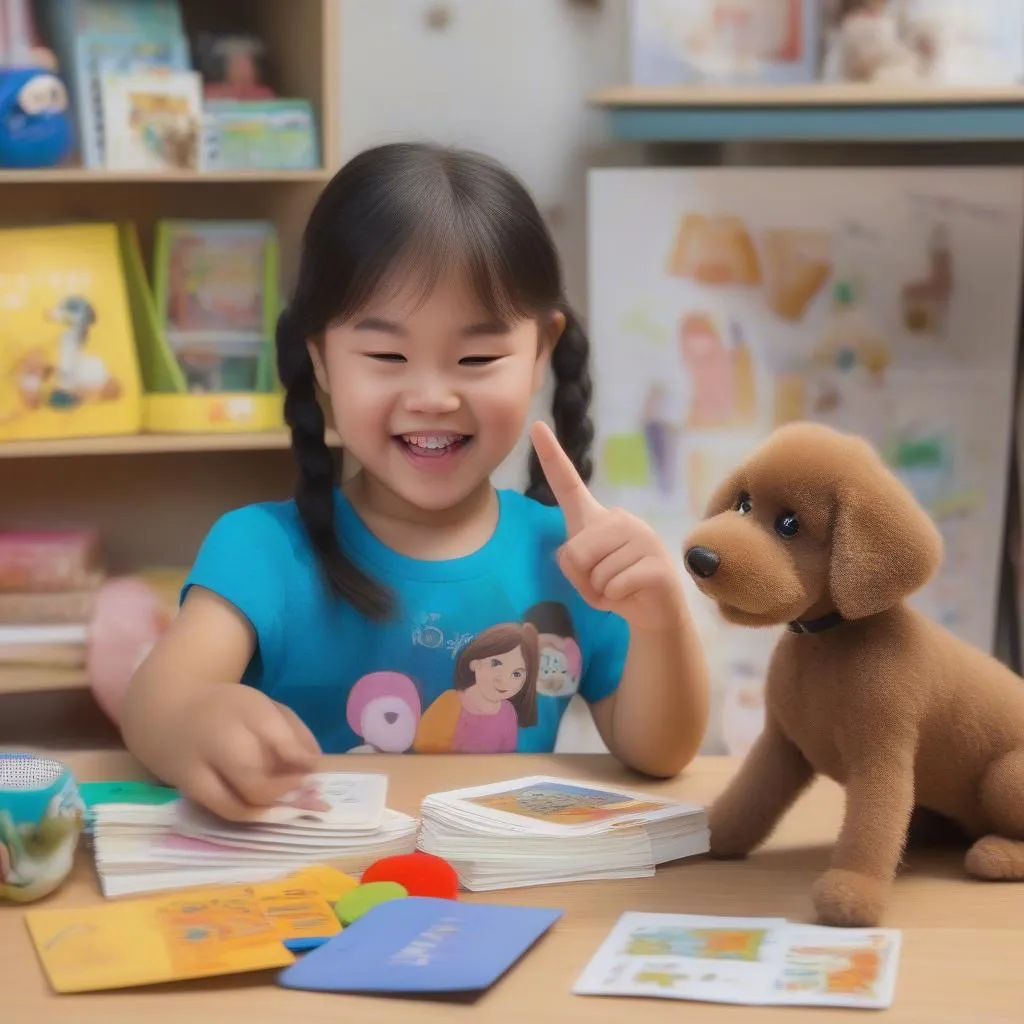The saying “A tree is tall because of the mountain, a person is respected because of their words” profoundly emphasizes the importance of language in everyone’s life. From a young age, building a strong vocabulary is the foundation for children to communicate confidently, learn, and develop comprehensively.
Why is Vocabulary Development Important for Preschoolers?
Imagine a young child, accidentally lost in a park. How would they ask for help if they didn’t know basic words like “Mommy,” “Daddy,” “aunt,” or “uncle”? Or, when they want to play with friends, how difficult would it be if they couldn’t express their desires?
A rich vocabulary not only helps children communicate effectively but is also the key to acquiring knowledge, forming thinking, and developing intelligence comprehensively. Mastering language will help them understand the world around them, confidently express themselves, and easily adapt to new environments.
Effective Ways to Develop Vocabulary for Preschoolers
1. Create a Rich Language Environment
Like “dripping water wears away a stone,” constant exposure to language is the most important factor in children’s vocabulary development. Parents and teachers need to create a rich, diverse, and engaging language environment for children.
- Talk to children frequently: Communicate with children using simple, easy-to-understand language, using short, memorable sentences.
- Read books to children: Choose age-appropriate books with vivid illustrations and engaging content.
- Sing, tell stories, play games: These activities help children absorb language naturally, joyfully, and effectively.
- Use pictures and toys: Help children associate images with words, memorizing vocabulary visually.
2. Effective Vocabulary Teaching Methods
Besides creating a favorable language environment, using appropriate vocabulary teaching methods is also crucial. Here are some suggestions:
- Repetition method: Repeat vocabulary words multiple times in different contexts to help children remember.
- Association method: Connect new vocabulary words with known words, making it easier for children to memorize.
- Game method: Create fun and engaging games so children can learn while playing, avoiding boredom.
- Visual method: Use pictures and objects to illustrate vocabulary, helping children learn easily.
- Sentence creation method: Encourage children to use new vocabulary words in simple sentences, helping them understand the meaning and usage of words.
3. Some Notes When Developing Vocabulary for Children
- Choose appropriate vocabulary: Select vocabulary words that match children’s learning abilities, avoiding words that are too difficult or too easy.
- Patience: Vocabulary development is a long process that requires patience and enthusiasm from parents and teachers.
- Motivate children: Praise and encourage children when they make progress, creating joy in language learning.
The Story of “Little Bi and the Flower Garden”
Little Bi loves playing in Grandma’s flower garden. Every time she visits Grandma, Bi gets to admire colorful flowers with fragrant scents. Bi’s favorite flowers are the crimson roses, with petals as soft as velvet. Bi often gazes at them, gently touches the petals, and smells their delicate fragrance.
Bi’s grandma often tells Bi about the types of flowers in the garden. She talks about roses, chrysanthemums, lotuses, orchids… and stories about the origins of each flower. Through Grandma’s stories, Bi learns many new vocabulary words about flowers, colors, scents, and how to care for flowers. Bi feels very happy and proud to be able to name each type of flower in the garden and tell their stories to friends.
Frequently Asked Questions about Vocabulary Development for Children
- How many words should a 3-year-old know? According to Dr. Nguyen Van A, an expert in Early Childhood Education, a 3-year-old should know about 500 words on average.
- How to make children interested in learning vocabulary? Create fun games, use pictures, objects, and engaging stories to help children absorb knowledge naturally.
- Which topics should be used to teach vocabulary to children? Vocabulary should be taught by topics suitable for children’s age and interests. For example, 2-year-olds can learn vocabulary about family, toys, animals, food, etc. 3-4-year-olds can learn vocabulary about nature, occupations, vehicles, etc.
Suggested Related Articles
Conclusion
Developing vocabulary for preschoolers is an important task for parents and teachers. By creating a rich language environment for children, using effective vocabulary teaching methods, and persistently pursuing the goal, you will help your children become smart, confident, and strong on their developmental path.
Leave a comment to share your experiences in teaching vocabulary to children!
